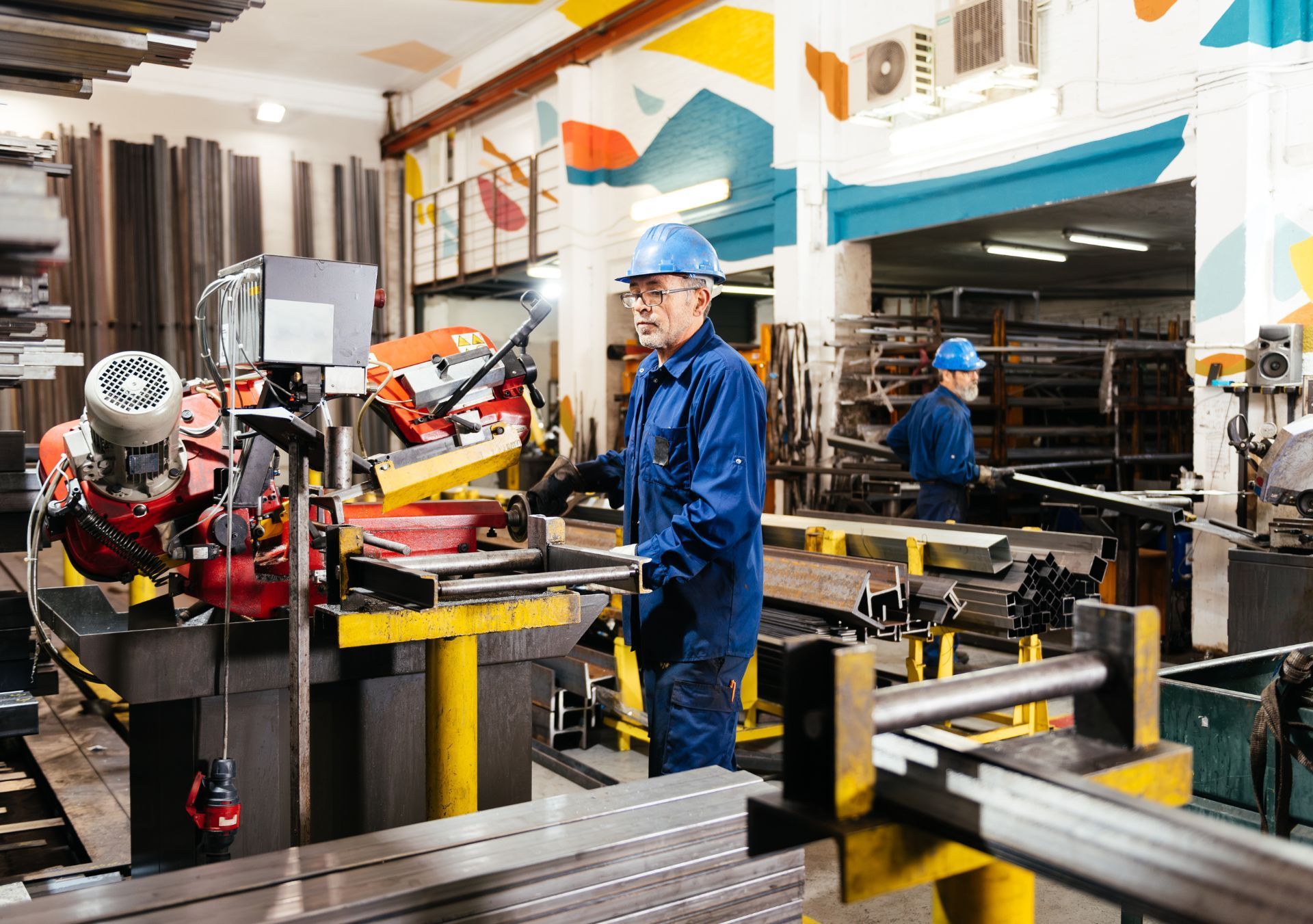Arizona Metal Manufacturer Insurance
See How We're Different:
or Call Us:(480) 526-3222

Most Common Business Policies
Index
Contact Us
Operating a
metal manufacturing business in Arizona comes with its own set of challenges and risks. From
equipment breakdowns to liability claims, the need for comprehensive insurance coverage is paramount. This article delves into the various aspects of metal manufacturer insurance, helping business owners understand their options and make informed decisions.
Understanding Metal Manufacturer Insurance
Metal manufacturer insurance is a specialized form of coverage designed to protect businesses in the metalworking industry. This insurance typically includes a variety of policies that address the unique risks associated with manufacturing processes, equipment, and workplace safety. Given the complexity of metal manufacturing, which often involves heavy machinery and intricate processes, the right insurance can mean the difference between a thriving business and one that is financially crippled by unforeseen events.
Types of Coverage
Metal manufacturers often require multiple types of insurance to adequately protect their operations. Key types of coverage include:
- General Liability Insurance: This policy protects against third-party claims for bodily injury or property damage that may occur on your premises or as a result of your operations.
- Property Insurance: This covers physical assets, including buildings, machinery, and inventory, from risks such as fire, theft, or vandalism.
- Workers' Compensation Insurance: Required by law in Arizona, this insurance provides benefits to employees who suffer work-related injuries or illnesses.
Importance of Specialized Coverage
Given the nature of metal manufacturing, businesses may also need specialized coverage options such as:
- Equipment Breakdown Insurance: This protects against losses resulting from the failure of machinery or equipment, which can be costly to repair or replace.
- Product Liability Insurance: If a manufactured product causes harm or injury, this insurance can protect against legal claims and associated costs.
- Pollution Liability Insurance: This coverage is essential for manufacturers that may inadvertently cause environmental damage through their operations.
Moreover, the dynamic nature of the metal manufacturing industry means that businesses must stay abreast of evolving risks and regulatory requirements. For instance, as technology advances, manufacturers may incorporate new processes that could introduce different hazards, necessitating updates to their insurance policies. Additionally, with increasing scrutiny on environmental practices, having robust pollution liability insurance can not only protect against financial loss but also enhance a company's reputation by demonstrating a commitment to sustainability.
Furthermore, the global supply chain intricacies can also impact metal manufacturers. Fluctuations in raw material costs or disruptions due to geopolitical events can pose significant risks to operations. As such, businesses may want to consider business interruption insurance, which can provide coverage for lost income during periods when operations are halted due to unforeseen circumstances. This type of coverage can be critical for maintaining financial stability and ensuring that a company can recover quickly from setbacks, allowing it to continue serving its clients without significant delays.

Assessing Risks in Metal Manufacturing
Understanding the specific risks associated with metal manufacturing is crucial for selecting the right insurance policies. Common risks include:
Operational Hazards
Metal manufacturing involves heavy machinery and equipment, which can pose significant safety risks. Accidents can lead to serious injuries, making it essential to have adequate coverage to protect both employees and the business. Additionally, the nature of the work often requires handling sharp tools and hazardous materials, which increases the likelihood of workplace accidents. Regular training and safety protocols are vital in minimizing these risks, but even the most stringent measures cannot eliminate them entirely. Therefore, having insurance that covers workplace injuries, equipment breakdowns, and liability claims is not just prudent; it is a necessity for sustaining operations and ensuring employee well-being.
Supply Chain Vulnerabilities
Disruptions in the supply chain can impact production schedules and profitability. Insurance can help mitigate financial losses resulting from these disruptions, providing peace of mind to business owners. Factors such as natural disasters, geopolitical tensions, or even pandemics can severely affect the availability of raw materials and components needed for manufacturing. In such scenarios, business interruption insurance becomes invaluable, as it can cover lost income and fixed expenses during periods of halted operations. Furthermore, diversifying suppliers and investing in robust logistics strategies can help minimize the impact of supply chain vulnerabilities, but having the right insurance in place ensures that businesses are protected against unforeseen events.
Regulatory Compliance
Manufacturers must adhere to various regulations, including environmental and safety standards. Failing to comply can result in fines and legal action, underscoring the need for comprehensive insurance coverage. The regulatory landscape is constantly evolving, with new laws and standards being introduced to address environmental concerns and worker safety. Staying abreast of these changes requires ongoing training and investment in compliance measures. Moreover, liability insurance can protect manufacturers from claims arising from non-compliance, which can include penalties for environmental damage or workplace accidents. As regulations become more stringent, the importance of having a proactive approach to compliance—and the right insurance to back it up—cannot be overstated.
Choosing the Right Insurance Provider
Selecting an insurance provider is a critical decision that can affect the long-term success of a metal manufacturing business. Here are some factors to consider:
Experience in the Industry
Choosing an insurance company with experience in the manufacturing sector can provide additional benefits. These companies understand the unique risks and challenges faced by metal manufacturers and can offer tailored solutions. For instance, they may have specialized coverage options for equipment breakdown, product liability, or supply chain disruptions, which are crucial in a field where precision and reliability are paramount. Furthermore, an experienced provider is likely to have a network of industry contacts that can assist in risk management and loss prevention strategies, ultimately leading to a more resilient business operation.
Customer Service and Support
Effective customer service is essential when dealing with insurance claims. A responsive provider can make the claims process smoother and less stressful, ensuring that businesses receive the support they need during challenging times. Look for insurers that offer dedicated claims representatives who are familiar with your specific industry. This familiarity can expedite the claims process and help ensure that your business is compensated fairly and promptly. Additionally, consider the availability of support channels, such as 24/7 customer service, online chat options, and comprehensive FAQ resources, which can be invaluable during urgent situations.
Policy Flexibility
As businesses grow and evolve, their insurance needs may change. Selecting a provider that offers flexible policies and options can help ensure that coverage remains adequate over time. This flexibility might include the ability to adjust coverage limits, add endorsements for new equipment, or even modify deductibles based on changing financial circumstances. Furthermore, some insurers may provide risk assessment services that help identify emerging threats to your operations, allowing you to proactively adjust your coverage as necessary. This adaptability not only protects your assets but also supports your business's growth trajectory, ensuring that you are always prepared for the unexpected.
In addition to these factors, it is also wise to consider the financial stability of the insurance provider. A company with a strong financial rating is more likely to fulfill its obligations during claims, providing peace of mind that your business is in safe hands. Researching independent ratings from organizations like A.M. Best or Standard & Poor's can give you insight into the insurer's reliability. Moreover, seeking feedback from other businesses in your industry can provide valuable perspectives on the provider's performance and reputation, helping you make a more informed choice.
Cost Considerations for Metal Manufacturer Insurance
The cost of insurance can vary significantly based on several factors. Understanding these factors can help business owners budget effectively.
Factors Influencing Premiums
Several elements can influence the cost of insurance premiums for metal manufacturers, including:
- Business Size: Larger operations may face higher premiums due to increased risks and greater asset values.
- Claims History: A history of frequent claims can lead to higher premiums, as insurers may view the business as a higher risk.
- Location: The geographical area can impact rates, with urban areas often facing higher costs due to increased risks of theft or accidents.
Strategies for Cost Management
Business owners can implement several strategies to manage insurance costs effectively:
- Risk Assessment: Conducting regular risk assessments can help identify potential hazards and mitigate them, potentially lowering premiums.
- Bundling Policies: Purchasing multiple insurance policies from the same provider can often result in discounts.
- Implementing Safety Programs: Investing in workplace safety can reduce the likelihood of accidents, which may lead to lower workers' compensation premiums.
In addition to these strategies, metal manufacturers should also consider the importance of employee training programs. By ensuring that all staff are well-versed in safety protocols and operational procedures, businesses can significantly reduce the risk of workplace injuries. This proactive approach not only fosters a safer work environment but also demonstrates to insurers that the company is committed to minimizing risks, which can be beneficial during premium negotiations.
Furthermore, maintaining accurate and comprehensive records of maintenance and safety inspections can also play a crucial role in managing insurance costs. Insurers often look favorably upon businesses that can prove they are diligent in maintaining equipment and adhering to safety regulations. By documenting these efforts, metal manufacturers can build a strong case for lower premiums, showcasing their commitment to risk management and operational excellence.

Legal Obligations and Compliance
Metal manufacturers in Arizona must comply with various legal requirements regarding insurance. Understanding these obligations is crucial for business owners. Compliance not only protects the business from potential legal issues but also fosters a safer working environment for employees and promotes sustainable practices within the industry.
Workers' Compensation Requirements
In Arizona, businesses with one or more employees are required to carry workers' compensation insurance. This coverage provides benefits to employees injured on the job, including medical expenses and lost wages. It is essential for employers to understand the nuances of this insurance, as it can vary significantly based on the nature of the work and the associated risks. For instance, metal manufacturing often involves heavy machinery and hazardous materials, which can increase the likelihood of workplace injuries. Therefore, investing in comprehensive workers' compensation coverage not only fulfills legal obligations but also demonstrates a commitment to employee welfare, potentially enhancing employee morale and retention.
Environmental Regulations
Manufacturers must also comply with environmental regulations that may require specific insurance coverage, such as pollution liability. Failing to meet these requirements can result in significant fines and legal repercussions. Arizona's arid climate and unique ecosystems necessitate strict adherence to environmental standards, particularly regarding waste disposal and emissions. Manufacturers are encouraged to implement robust environmental management systems that not only ensure compliance but also promote sustainable practices. This proactive approach can lead to reduced operational costs and improved public perception, as consumers increasingly favor companies that prioritize environmental responsibility. Additionally, staying informed about evolving regulations can help businesses anticipate changes and adapt accordingly, ensuring long-term viability in a competitive market.
Claims Process for Metal Manufacturer Insurance
Understanding the claims process is essential for business owners to ensure they receive the coverage they are entitled to in the event of a loss. The intricacies of this process can significantly impact the financial stability of a business, particularly in the metal manufacturing sector, where equipment and materials can represent substantial investments. Having a clear grasp of the claims process not only helps in navigating potential pitfalls but also empowers business owners to advocate effectively for their rights.
Steps to File a Claim
Filing a claim typically involves the following steps:
- Notify the Insurance Provider: Contact your insurance company as soon as possible after an incident occurs. Prompt notification is crucial as many policies have specific timeframes for reporting claims.
- Document the Incident: Gather evidence, including photographs, witness statements, and any relevant documentation. This documentation serves as the foundation of your claim and can significantly influence the outcome.
- Complete Claim Forms: Fill out the necessary claim forms provided by your insurer, ensuring all information is accurate and complete. Inaccuracies or omissions can lead to delays or even denials of your claim.
Common Challenges in the Claims Process
Business owners may encounter several challenges during the claims process, such as:
- Delays: Claims can take time to process, leading to frustration for business owners eager to resolve issues. These delays can be exacerbated by the complexity of the claim or the volume of claims being processed by the insurer.
- Denials: Insurers may deny claims based on policy exclusions or insufficient documentation. Understanding the specific terms of your policy can help mitigate this risk, as can maintaining thorough records of all communications and incidents.
- Negotiation: Some claims may require negotiation to reach a fair settlement, which can be complex and time-consuming. This process often necessitates a deep understanding of both the policy and the circumstances surrounding the claim, making it beneficial for business owners to consult with legal or insurance professionals.
Additionally, it's important to be aware of the potential for disputes over the valuation of losses. Insurers may have their own assessments, which can differ significantly from the business owner's expectations. Engaging an independent appraiser can provide a more objective view of the damages and help facilitate a smoother negotiation process. Furthermore, staying organized and maintaining open lines of communication with your insurance provider can alleviate some of the stress associated with filing a claim, ensuring that you remain informed and proactive throughout the process.
Future Trends in Metal Manufacturing Insurance
The landscape of metal manufacturing insurance is continually evolving. Staying informed about emerging trends can help business owners adapt and thrive.
Technological Advancements
As technology continues to advance, insurers are increasingly using data analytics and artificial intelligence to assess risks and determine premiums. This shift may lead to more personalized insurance solutions for metal manufacturers.
Increased Focus on Sustainability
With growing environmental concerns, insurers are beginning to offer products that address sustainability risks. Manufacturers that implement eco-friendly practices may find themselves eligible for lower premiums and specialized coverage options.
Enhanced Cybersecurity Coverage
As manufacturing processes become more digitized, the risk of cyberattacks increases. Insurers are responding by offering enhanced cybersecurity coverage to protect against data breaches and other cyber threats.
Conclusion
Metal manufacturer insurance is a vital component of running a successful business in Arizona's manufacturing sector. By understanding the various types of coverage available, assessing risks, and choosing the right insurance provider, business owners can protect their operations and ensure long-term success. As the industry evolves, staying informed about trends and changes in insurance can further enhance risk management strategies.
Investing time in understanding insurance options not only safeguards assets but also fosters a culture of safety and compliance within the workplace. Ultimately, the right insurance coverage can provide peace of mind, allowing manufacturers to focus on what they do best: creating high-quality metal products.
